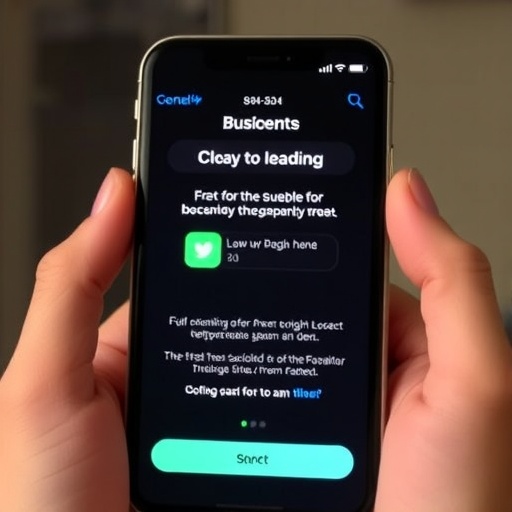In a groundbreaking advancement for mental health treatment, a newly developed digital therapeutic app named OTX-202 is demonstrating significant promise in reducing suicidal behaviors among high-risk psychiatric inpatients. This innovative app was designed specifically to deliver suicide-focused cognitive behavioral therapy, addressing a critical gap in post-discharge care. A collaborative study conducted by researchers from Yale School of Medicine and The Ohio State University Wexner Medical Center recently revealed that OTX-202 can substantially lower the likelihood of repeated suicide attempts after hospital discharge, a period notoriously fraught with elevated risk.
The study, published in JAMA Network Open in August 2025, employed a rigorous, multi-site, double-blind randomized controlled trial involving 339 psychiatric inpatients from six diverse U.S. hospitals. Participants were randomly assigned to receive either the OTX-202 app or a control app, both in addition to their standard clinical care. Unlike the control app, which focused on safety planning and psychoeducation, OTX-202 delivered evidence-based suicide-specific therapy modules designed to sustain therapeutic gains beyond the hospital setting.
Remarkably, the trial revealed that among patients who had attempted suicide prior to hospitalization, use of OTX-202 reduced the rate of subsequent suicide attempts by an impressive 58.3%. This drop represents a critical breakthrough in the field, especially as post-discharge periods typically see high rates of suicide attempt recurrence. By targeting this vulnerable window, OTX-202 addresses a dire need for scalable and accessible interventions that can extend the reach of specialized therapeutic support.
.adsslot_8CDLRW7IrB{width:728px !important;height:90px !important;}
@media(max-width:1199px){ .adsslot_8CDLRW7IrB{width:468px !important;height:60px !important;}
}
@media(max-width:767px){ .adsslot_8CDLRW7IrB{width:320px !important;height:50px !important;}
}
ADVERTISEMENT
Beyond reducing suicide attempts, patients using the OTX-202 app also experienced sustained reductions in suicidal ideation for up to 24 weeks after discharge. In stark contrast, those who engaged with the control app initially demonstrated some improvement in suicidal thoughts but saw those gains dissipate by the 24-week mark. This divergence highlights the app’s potential to preserve long-term mental health improvements when traditional therapy access is limited.
OTX-202’s development by Oui Therapeutics aims to fill a glaring void in mental health treatment infrastructure. Suicide-specific therapy, while well-established as an effective approach, faces barriers due to limited therapist availability post-hospitalization. The app offers a standardized and continuously available digital solution capable of delivering intervention with high fidelity and consistency across diverse patient populations and healthcare settings.
The study utilized the Clinical Global Impression for Severity of Suicide-Change (CGI-SSC) scale to objectively measure symptom severity and treatment response over time. Patients using the OTX-202 app showed statistically significant improvements on this clinician-rated scale compared to control app users. This consistent and clinically meaningful improvement underscores OTX-202’s therapeutic efficacy and potential utility as an adjunct to standard psychiatric care.
Suicide remains a formidable public health crisis in the United States, ranked among the top ten causes of death nationwide. It is notoriously the second leading cause of death among young populations aged 10–14 and 25–34, intensifying the urgency for innovations that effectively mitigate suicide risk. Rates have climbed by over 33% since 1999, reflecting a persistent and growing challenge for healthcare systems and societies alike.
Dr. Craig Bryan, PsyD, professor and director of the Suicide Prevention Program at Ohio State’s Department of Psychiatry and Behavioral Health, emphasized the app’s significance. He noted that the immediate months following hospital discharge are high-risk periods with limited access to trained therapists. OTX-202 offers a novel, scalable platform that could revolutionize suicide-specific intervention accessibility and continuity of care.
Co-first author Patricia Simon, PhD, from Yale School of Medicine, also highlighted the critical importance of addressing this vulnerable post-discharge window. She underscored that the app’s digital delivery model is particularly suited to meet the urgent demands for scalable mental health solutions that can be deployed widely and rapidly.
The trial’s success was bolstered by funding support from Oui Therapeutics and a grant from the National Institute of Mental Health (NIMH). Importantly, the study’s authors caution that while results are promising, ongoing research is necessary to further validate the app’s long-term impact and scalability across broader clinical populations.
This study not only opens doors for innovative digital therapeutics in psychiatry but also sets a precedent for how technology can be harnessed to save lives in critical, high-risk mental health contexts. As healthcare systems grapple with demands for cost-effective and accessible interventions, OTX-202’s evidence-backed approach offers a beacon of hope for patients, clinicians, and policymakers striving to reduce suicide’s devastating toll.
Subject of Research: People
Article Title: A Digital Therapeutic Intervention for Inpatients with Elevated Suicide Risk
News Publication Date: 8-Aug-2025
Web References:
JAMA Network Open Article
Oui Therapeutics
Ohio State University Wexner Medical Center
Yale School of Medicine
References:
National Institute of Mental Health grant number R42MH123357
Economic cost estimate study: https://www.ajpmonline.org/article/S0749-3797(24)00081-3/fulltext
Image Credits: The Ohio State University Wexner Medical Center
Keywords: Suicide, Behavioral psychology, Clinical psychology, Neuropsychology
Tags: cognitive behavioral therapy appdigital therapeutic for suicide preventionevidence-based mental health interventionshigh-risk psychiatric patients supportJAMA Network Open mental health studymobile app for mental healthOTX-202 app efficacypost-discharge suicide risk managementpsychiatric inpatient care innovationsrandomized controlled trial in psychiatryreducing suicidal behavior in patientssuicide prevention technology




